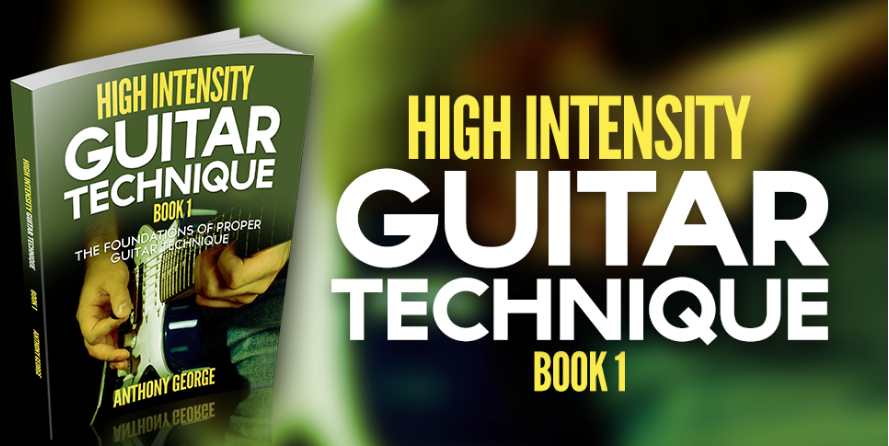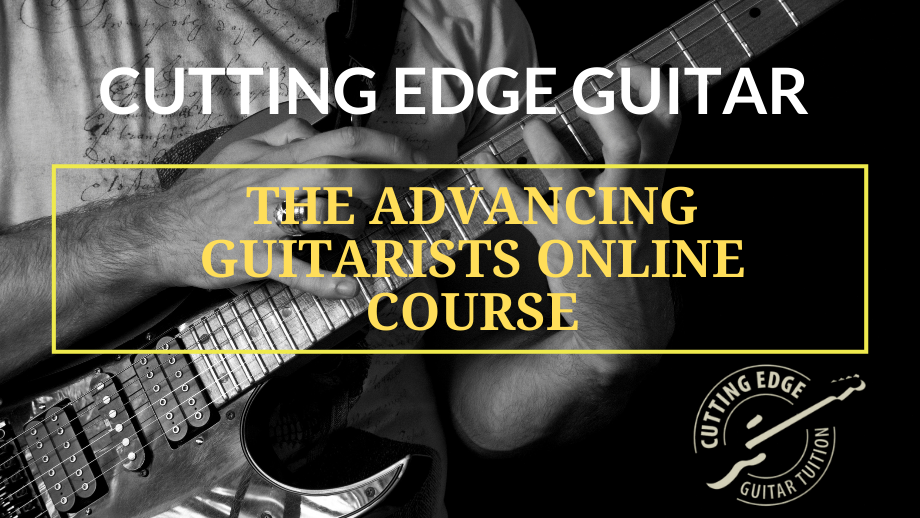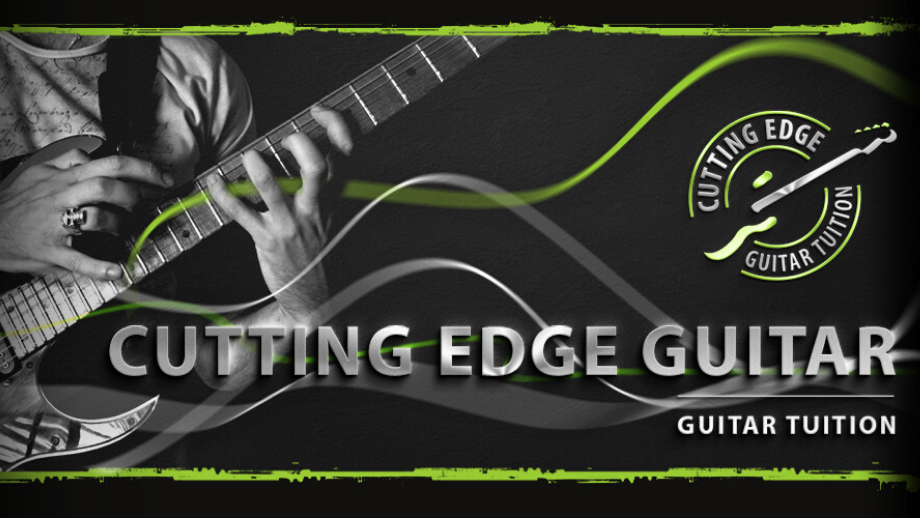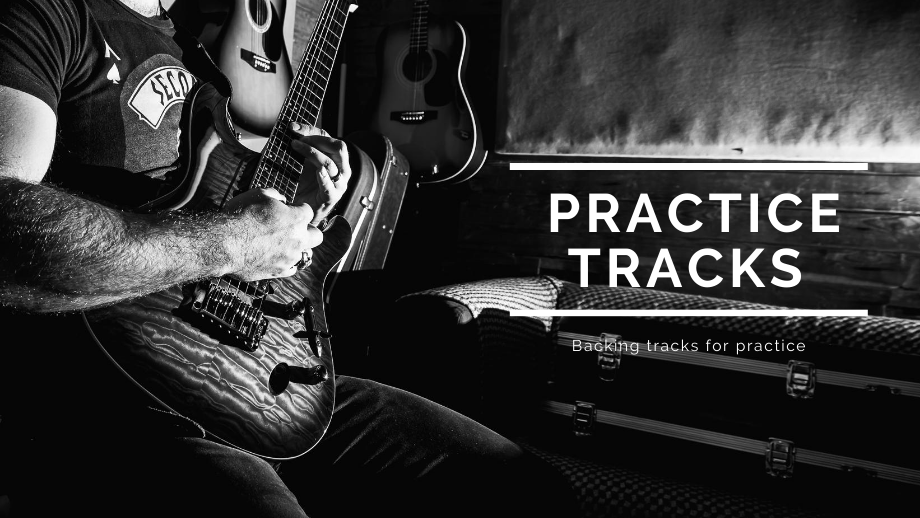Coming in 2021, The Advancing Guitarist's online courses will provide a new way for guitarists to study their chosen instrument. The Cutting Edge Guitar Advancing Guitarists courses have been designed to help aspiring Rock, Blues and Jazz-Fusion guitar players who feel stuck in a rut, to break free from the musical chains that are holding them back.
What Are The Benefits Of The Advancing Guitarists Courses?
- Structured Learning – You will study an expertly written course that has been designed to equip you with the fretboard knowledge, technique and musicality you need to accomplish your goals. With so many books, DVDs, magazines and online tutorials available, it isn't easy to know where to start. The Advancing Guitarists courses deliver structured learning so that you see progression and results lesson by lesson
- Quality Resources – The Advancing Guitarists courses use a mix of HD video, PDF fretboard diagrams, Guitar pro files, Mp3 audio and text tutorials to guide you on your path to virtuoso guitar playing.
- Expert Tuition – Receive guidance and coaching from a guitar expert who has studied and played at the highest levels with some of the best players in Europe. Anthony George is well versed in advanced guitar tuition and uses the same ethos as elite music colleges, delivering lessons that have a personalised, one-to-one feel even though you are studying online.
- Value for Money – Studying an Advancing Guitarist Course is much cheaper than one-to-one lessons.
- Experience Music College Style Learning – If you always wanted to go to music college but couldn't, The Advancing Guitarists courses make this experience available to you, at a fraction of the cost and from the comfort of your own home.
- Become an Improved Instrumentalist – By studying an Advancing Guitarist course, you will improve your technical skills so that you can play the music you've always wanted to play.
- College Level Made Accessible – Not everybody can go to music college, there are often barriers that stop us from being able to do what we want to do.
Studying on an Advancing Guitarists course gives you the maximum value for your money, delivering high end, college-level instruction for a fraction of the cost and time of studying elsewhere.
The Advancing Guitarists Courses
After studying the guitar for 20 years at the highest levels and with over a decade of guitar teaching experience behind him, course director Anthony George had discovered some key areas that many advancing guitar players have trouble with:
- Technique – A really common problem in all styles of music, not being able to play fast passages or being able to hear what you want to play in your head when improvising, but not having the skills to execute it.
- Fretboard Knowledge - Similar to technique, many guitar players have a weakness when it comes to scales, chords and arpeggios. Poor knowledge of your fretboard can damage your music when playing the rhythm and lead parts that you aspire to. Blues players tend to find that playing over the whole neck is challenging, or they struggle to outline the changes that define the Blues. Jazz players have similar issues, whereas, for Rock and Metal players, scales, modes and arpeggios are often overlooked skills.
- Musicality - Players of all genres can often copy the licks and riffs of heroes but feel that it just doesn't sound as good when they play.
Alongside these common issues, students can feel isolated when studying material on YouTube and other online resources. There is so much information available online; knowing where to start, what to watch and how to structure your study can be challenging. On The Advancing Guitarists courses, this issue has been dealt with for you. The courses are structured to give you the tools you need to achieve maximum progress, in a logical, methodical manner.
The History behind The Advancing Guitarists Courses
Anthony George was lucky enough to spend time at ICMP (The Guitar Institute) in London, studying under some of the world's leading guitar experts:
- Martin Goulding (Jamtrack Central's online degree Head Tutor)
- Charlie Griffiths (Prog Metal band Haken's lead Guitarist)
- Dario Cortese (Larry Carlton, Brett Garsed)
- Gianluca Corona (Al Di Meola, John Scofield)
As a face to face and online teacher, Anthony is often asked about his journey as a musician. When he tells the story of his time at The Institute, students are blown away by tales of studying high octane guitar, all day, every day while being surrounded by like-minded people doing what they love the most. Typical responses are "Wow, that sounds amazing. I wish I did that!", or "You're so lucky to have been able to have that experience". With the challenges that guitar students face being the same time and again, Anthony decided to launch The Advancing Guitarists courses. The intention here is to make his experience available to others, giving this opportunity to those who are unable to attend Colleges like The Guitar Institute themselves. On the Advancing Guitarists courses, students experience music college learning from the comfort of their own home, studying a condensed version of the now world-famous Guitar Institute ideology. Learning on The Advancing Guitarists online courses is broken down into four volumes that cover all the essential technique, fretboard knowledge and skills for implementation for you to be able to reach your goals.
Core Concepts Covered
Technique
Master your style, from Blues or Rock to Jazz, having great technique will allow you to play anything!
- Legato (hammer-ons, pull-offs and slides) – Legato is a broad musical term that means something should be played smoothly. For guitar players, this means using a mixture of hammer-ons, pull-offs and slides to get an effect that Joe Satriani describes as sounding like liquid mercury.
- Alternate Picking – Alternating the direction your pick moves in allows you to play faster than using one type of stroke. Alternate picking also helps your playing stay in time.
- String Bending and Vibrato – Bending strings and adding vibrato to your notes is vital for adding a professional polish to your playing.
- Sweep/Economy Picking – Sweeping provides us with an ultra-efficient way of playing arpeggios, and economy picking does the same for scalar passages.
- Tapping – Tapping allows us to extend the range of our legato playing by using fingers from the picking hand to execute notes.
- String Skipping – Playing through scales sequentially can sometimes sound a bit predictable, string skipping cures this by reordering the notes.
- Hybrid Picking – Combining pick and fingers opens up a wide range in the fretting hand and also gives you a fresh tonal flavour.
Fretboard Knowledge
There is no point in having a great technical facility but not knowing where your devices are on the fretboard. It's only by choosing the right notes that you can make good music. In all course volumes, you will learn the guitar neck inside and out by using systems and harmonic devices such as:
- The CAGED System - So called as it is fundamentally based on the shapes of an open C, A, G, E and D chord. The CAGED system is a powerful tool for learning interval relationships, chords, scales and arpeggios all over the neck, and is a very useful way for navigating chord changes when soloing or playing rhythm.
- The Arpeggiator system - Teaches you how to find different keys in one fretboard area for chords, scales and arpeggios.
- The Three Notes Per String System – This system lays out scale patterns with three notes played on every string in one position. It's a very useful system for playing technical passages. Commonly associated with scalar playing, you can also incorporate arpeggios and triads with three notes per string.
- The Four Notes Per String System – By connecting three notes per string areas, you can also get four notes per string patterns. Used by players like Allan Holdsworth, this system is great for extending the fretboard.
- Octave Displacement or Scale Chunking – This system provides a great way to cover lots of ground on the neck very quickly.
- Linear Playing (along the length of strings) – Playing along the length of a single string is a great way to visualise intervallic relationships and also gives runs a very violin-like quality.
- Positional Playing – Positional playing is all about being able to hit lots of different musical devices, such as intervals, triads, pentatonics, arpeggios, scales and playing changes without having to move up and down the fretboard.
- Combination Playing – Combination playing is ultimate fretboard freedom, being able to play all over the whole neck, and combining all of the other systems so you can go wherever you want and play anything.
- Triads - Open and close voiced triads.
- Pentatonic and Blues scales - Five positions relative to CAGED, and how to connect them, so you know the scales, full fretboard.
- Chords and Arpeggios - Major, Minor, Major 7, Dominant 7, Minor 7 and Minor 7 flat 5 chords and arpeggios relative to CAGED and how to hit key changes with them. We will also discuss altered Maj7, Altered dominant 7 and Diminished 7th arpeggios throughout the four volumes of the course.
- Modes - The modes of the Major Scale, Melodic and Harmonic minor aligned with CAGED and three notes per string systems.
- Symmetrical scales – Such as diminished and whole tone
- Intervallic studies - including 3rds, 4ths, 5ths and 6ths.
No one system completely teaches the guitar, but by learning several systems and combining them, you can become a complete fretboard master.
Theory
Anthony George is a big believer in knowledge is power, and knowing music theory empowers your playing so that you can make informed decisions about what you want to play, not just hitting notes and hoping for the best. On The Advancing Guitarists courses, you will study concise theory concepts. The theory is not complex, daunting, or overbearing. We learn just the stuff you need, NOT hours of unnecessary study.
Theoretical concepts include:
- Interval mapping scales
- Harmonising scales
- Creating triad formulae
- Seventh chords and arpeggio formulae
- Extension tones
- Modes of the Major Scale
- Modes of Melodic Minor
- Modes of Harmonic Minor
- Implementation
Once you have built your fretboard knowledge, technique and theory to a sufficient level, you need to implement these ideas so you can use them musically. On the Advancing Guitarists courses, you will do this by learning:
- Modal soloing using the scale pyramid – The scale pyramid is a powerful soloing concept that allows you to identify a base seven-note scale for whichever chord type or riff you are playing over. Anthony uses this method as a way of ‘’thinking’’ your way through solos to sound melodic and interesting. Once you have your seven-note base, using the scale pyramid, you can then extract from it six-note (hexatonic), five-note (pentatonic), four-note (arpeggios), three-note (triads) and two-note (interval) soloing options. The scale pyramid provides you with an almost limitless amount of tools you can use when improvising and writing melodies, breaking you out of box patterns and guitar cliches.
- Soloing over changes – Many guitarists get stuck in the rut of trying to find one scale that fits all of the chords of a tune or track they are soloing on. Blues and rock players know this only too well, but imagine how much more melodic you could be if you could target the chord and its tasty extension tones on the fly. Playing over jazz and fusion style changes is also impossible if you can't do this. The Advancing Guitarist's courses show you how!
- Licks – Once you've learned to utilise the power of the scale pyramid, you will learn licks that combine these amazing soloing opportunities with the different techniques studied.
- Musical studies – All of these concepts are amazing and will propel your playing in a new direction, but sometimes it is nice to study a piece of music you can learn to play. The Advancing Guitarist's courses contain some well-structured solos that utilise everything you've learned on the course.
When implementing the skills learned on the course, you will study the style and influences of some of the most cutting edge guitar players of all time, from all genres, including:
- Jimi Hendrix
- Jimmy Page
- Van Halen
- Rhandy Rhoads
- Joe Satriani
- Steve Vai
- Stevie Ray Vaughan
- Robben Ford
- Larry Carlton
- Guthrie Govan
- Frank Gambale
- John Petrucci
- Eric Johnson
- Allan Holdsworth
- Jason Becker
- Richie Kotzen
- Paul Gilbert
- Greg Howe
- Yngwie Malmsteen
- John Scofield
- Wes Montgomery
- George Benson
- and many, many more!
In Essence, by setting up The Advancing Guitarists courses, Anthony is offering you the opportunity to experience something you thought you might have missed out on. His vision for The Advancing Guitarists course is for you to study from a creative, inspiring resource, offering expert, structured and progressive guitar tuition delivered in a friendly and casual atmosphere.
By taking your place on one of these exciting new courses, you will gain the confidence, the technique and the knowledge to play the music you've always wanted to play!
So what are you waiting for? Register your interest in The Advancing Guitarists online courses today by downloading a full copy of the course prospectus and receive a free copy of Anthony's popular book High Intensity Guitar Technique 1!

| Download the full course prospectus now and receive a free copy of High Intensity Guitar Technique worth £14.99 on amazon! | Download Now |



